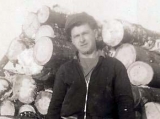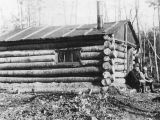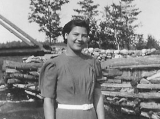After Dad passed away on October 22, 2005 I was surprised to find the following stories he had written about our family history. I feel that Dad would want these stories shared.
Early Years at French River by Edmund Hass Sr.
Dad (Gustav Hass 1886-1960) left the farm at an early age. He was a fur trapper, a lumber jack in the logging camps and river drives. He was a teamster and worked in the saw mill. It was a hard life, working from can ‘till can’t. It was virgin pine timber and the camps were in the Lake Nipissing area. The logs were floated down the French river to Georgian Bay where the saw mills were. They were big mills at Britt and Point Au Baril; some of the logs were taken as far as Parry Sound.
Around 1900 Grandpa Croteau was one of the pioneer farmers in the Noelville area. That is where Dad met Mother. I was born there in 1918.
Dad had a team of horses and had the contract to haul goods from Rutter, on the CPR tracks, to Noelville. The roads were very rough and the trip was about 18 miles. He hauled material for a number of years and then sold the horses when he got a job as fire ranger. He patrolled the 18 mile island on the French River by canoe. He would leave home in Bigwood Bay, travel the North Channel and return down the main channel, running all the rapids on the way. There were the Rainy, Pines, Blue Chute and the Parisienne rapids where it is said the Jesuit fathers were ambushed and killed by raiding Iroquois.
The French River is very scenic and at the time there were a lot of logs on the river going to the mills. One of the means of moving the logs was called an alligator. It was a steam paddle wheeler and it had a winch with over a mile of cable that you hooked on the boom of logs. You tied off to shore and pulled the logs by winch. It was a slow process, but necessary because of the west winds.
There was one steam tug on the French later belonging to Marathon Lumber Co. The mill was off Dry Pine Bay at Mill Bay. Dad had moved us from Noelville to a log house by the long bridge on Bay of French River. On one of his trips he rented a house by the mill at Bigwood.
One of my earliest memories was the day we went by canoe on the big bay near Meshaw Falls. There was a terrible storm and Mother was afraid we would be drowned. We spent a number of years at Bigwood mill. After Dad quit being a ranger he worked at the mill, on river drives and lumber camps. This was a great place to grow up with big sawdust piles and lumber piles to play on. Dad built a house on a point across from the mill. It was great, I could fish, go boating and then in 1925, when I was seven I started school. I had to walk about 2 miles, not much fun in the winter but there were a lot of families, so lots of company.
When I was about 18 months, Mother and I spent some time with Dad’s brother on the farm at Eganville. I can’t remember much of this but I can recall Grandma Hass scrubbing the floor. Mother had twins born to her there but they did not live.
In 1925 or 1926, Dad did a river drive on the Mississippi River. We stayed at Carleton Place. My sister Lilly was quite small. We stayed with people named Briscoe. He had a team of dray horses. She kept boarders and rented rooms to people.
About 1928 we moved to Pakesley. The Bruce Lumber Company was about 12 miles on the Kawigamog Lake at a place called Lost Channel, now highway 522. At Lost Channel the people who had a tourist lodge there, Courtney’s Lodge, gave me a spaniel pup called Beauty. She was the best grouse dog I ever saw, no problem getting birds with her.
Lost Channel
The company had their own railway line and trains. They would bring the box cars in to the mill, load the lumber and haul them back to the CPR line. Dad worked in the lumber mill where the logs came from the river, up a chain and he sorted the logs to the saws. There was a double cutting band saw and a circular saw that squared the log for the bull edger. It was great to see the way the logs turned to lumber.
It was a good year spent at Lost Channel. In August Mother took us on a trip to Eganville. It was great, so much to do, Lilly and I sure were busy. On the way back Mom stopped at Markstay to see her sister, Delphine. Her family had scarlet fever and of course we got it. Boy, were we sick!
When we were over the fever we moved back to Bigwood to a log house by the railway crossing. There was a section house there where the foreman on the railway tracks lived, the peoples names were Charette and we visited together. And again we moved to Bigwood Bay and rented a house from the sawmill people, named Bakers. Dad worked at the mill for a few years and then got a job with some Americans, looking after their camps and taking them on fishing trips. The people, Washburn and DeBurg, were good to work for and the pay was better than at the mill.
Grandpa Hass’ Hunt Camp
Dad also had hunters who came in the fall to hunt. He had a camp on the north channel, near Cedar Rapids. I remember two of them, Harry Sheafer and Doc Clement. It was a real trip up from Bigwood Bay. They had a 18 foot canoe and a18 foot square stern with a 2 horse power Johnson on it. They had to portage Meshaw Falls and the Qullette Rapids to get to the camp. The hunting was good, plenty of deer and grouse. When I was old enough I went on the hunt with Dad and help out. Dad was a great guide and a very good camp cook. I really liked to go for grouse with Doc Clement. He had a double barreled Parker shotgun and was an excellent wing shot. The two weeks sure went fast at camp except for rainy or snowy days.
Those were good days but times were tough and money not too plentiful. The money from the fall hunt went for winter food. Mum and Dad would go to Sudbury for groceries. The order went like this:
10 bags of Harvest Queen Flour, white
1 bag flour, brown – 100 lbs
2 cases of tomatoes
2 cases of corn
2 cases of peas
2- 20 lb pails of lard
1- 20 lb pail of strawberry jam
1 bag of white sugar (100 lbs)
50 lbs brown sugar
Other items like molasses, coal oil, salt, pepper, tea, coffee was bought locally.
Meat and potatoes came from Grandpa Croteau’s farm and we ate a lot of venison, believe me.
The depression years were tough – lots of hand-me-downs. Mother was a very good seamstress and made a lot of our clothes. The year I was twelve (1930) I caddied on the golf course and I made enough money to buy a bicycle, a .22 repeater rifle and bought my books for high school. So in between school, hunting and fishing time went fast and i enjoyed it very much. The next year I made enough money to buy my own winter clothes. That was a mistake because I’ve been buying them ever since! By the time I was 15 I had 2 years of high school. That was all you could get in our public school and I couldn’t get a loan to go to school at Coniston – so it was a job I needed.
Camp
As luck would have it Tom Schell got a contract to cuit logs for Laidlaw Belton Lumber Company and I asked him if I could work for him. As I look at it now he was great for giving young people a chance and I had experience with saw and axe. So in September with my packsack I was off to the lumber camp. Oh yes, the pay was $1.00 per day. With $1.00 for doctor and $1.00 for your laundry it left you with $24.00 a month. As one old guy in camp would say, $1.00 a day and a million days we’ll be millionaires, I never made that one! I worked ’till xmas time and didn’t go back until the spring to work the river drive to bring the logs to the mill. The mill was set up on the Schell farm, now Schells Camp. After the logs were sawed I started guiding tourists for the Chalet Lodge. It was good money, $4.00 a day and your lunch but being a new guide I didn’t work steady so I ended back at the saw mill. Also, when I was sixteen (1934-5) I bought a old car from Harvey Schell. It was a 1928 Studebaker, six cylinder, a thing of beauty – seats were plush velour. I would love to have it now with 20 inch wheels it took a lot of snow to ground you. Oh yes, gas was 25 cents a gallon but then money was scarce.
In the spring of 1937 or 38 I hired on with the surveyors on 69 highway. I started at Britt as a linesman cutting the line ahead of the instrument. I saw some country, we ran three lines from Britt to Sudbury. One of our camps was in Delamere (The Horth family lived back in Delamere and that is where Dad first met Mom). It was tents to sleep in and one big tent for the cook. Up tp that time it was the best food I ever ate, sure not like the river drive or lumber camps. We finished there and the camp was moved to Burwash. It was quite the trip, no roads, we carried the survey lines across country. We slept out two nights carring our food and bedding. I was lucky as I had an old sourdough for a partner. He had adown sleeping bag, great! And for supper he made sourdough bread. After we finished at Burwash I went back to French River. I was only back a day or so when Mr. Spears came and wanted me at the mill. The logs at the mill were in a mess as there was no one to work them or run the boat. I got Dad to help me on the boat. It was a good time and we towed boom timber up to the rapids to put across the river when the logs would come down in the spring. Once the mill had cut all the logs, it was a trip to Sudbury to buy winter clothing then up to the camp for the winter months.
One Saturday night I came down the river with the drive boat and brought some of the crew. I went to the house and my sisters, Lily and Louisa wanted me to go to the dance at the hotel, I finally relented and went with them. Louisa and I got into a square and it really felt good. Later, Louisa introduced me to a pretty girl, it turned out to be Evelyn (my Mother). We chatted and had a coke then, when the next dance, started we danced and danced – that was the begining. The next day, Sunday, I had lunch with her parents, Mr and Mrs Horth and we sort of got along alright. Saturday nights we would get a few couples and go to Noelville, dance a bit and get some ice cream. That was our entertainment, no TV and no radio in the car. Someone would play a mouth organ and we would sing along. I must say it sounded pretty good.
Evelyn Horth
* At this point in Dads narrative the timeline gets a little hazy so I’ll sum this part of the story up the best I can * Things got serious, they were very much in love but there were obstacles to their romance. Canada was at war and Dad had signed up to serve his country. The other barrier to their future together was religious differences. Dad was protestant and Mom was catholic and there was no way the families would allow them to marry. But Dad had underestimated Moms love for him, as he wrote, ” When I saw that things were getting serious I said to her I think we should break this off. When she asked why I told her that we are of different faiths and I can’t change mine and I would not ask you to change yours. She said, Let me be the judge of that!. That was the end of that, no more was said.” By this time Mom was working in Sudbury and they would see each other from time to time. They would see a show and have a meal together at a local cafe. This was fall 1941 and Dad went to North Bay for army training. When Dad got back in December arrangements were in place and on the 21st they were married in Copper Cliff. Aunt Jeanette and Uncle Matt stood up for them. They all celebrated together and later that night they took the train to Rutter to “face the music”. Grandpa Horth was furious that Mom had eloped and had married a protestant. It took Grandpa a while to accept it but he eventually did.
Edmund Wilfred Hass
Born: August 15, 1918
Place: Noelville, Ontario
Military Service: Veteran of WW2. Served with the Royal Canadian Regiment through the Italian Campaign, France, Belgium, The Netherlands & Germany
Occupations: Lumberjack, Fishing Guide, Soldier, Heavy Equipment Operator/ Hoisting Engineer, Owner/Operator Georgetown Excavating & Ed’s Live Bait, French River, On.
Interests: Ed was a first & foremost a family man. He loved spending time outdoors in the FrenchRiver area; fishing, hunting & especially shore lunches. He enjoyed carpentry & building rustic furniture.He is a past member of the North Halton Curling Club, Georgetown Revolver Club, Georgetown Anglers & Hunters as well as being a member of Branch # 564 of the Royal Canadian Legion, Sudbury and the Georgetown Mason’s #219 Credit Lodge.
Wife: Evelyn Marie Horth deceased Dec. 10, 1965
Remarried to Alca Labrosse


